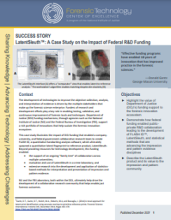Development
The need for research-based tools for personnel selection and assessment in the forensic sciences
STRait Razor v2.0: The improved STR Allele Identification Tool – Razor
LatentSleuth: A Case Study on the Impact of Federal R&D Funding
NIST Footwear Impression Comparison System
NIJ Awards Over $14M to Support Forensic Science Research and Development
On December 17, 2022, NIJ, a component of the Office of Justice Programs, announced $14.4 million in funding to support 30 forensic science research and development projects in fiscal year 2021 under its Research and Development in Forensic Science for Criminal Justice Purposes solicitation. Through its research and development (R&D) grant funding, NIJ continues to advance the speed, accuracy, and reliability of forensic analysis, which...
Multilevel Evaluation of Project Safe Neighborhoods
Project Safe Neighborhoods (PSN) is a DOJ-sponsored initiative to reduce violent crime, particularly gun crime, by fostering cooperation by criminal justice agencies and local partners to develop and implement strategic approaches.
See the YouTube Terms of Service and Google Privacy Policy
Improving identification of unknown American Indians and Hispanic/Latinx Americans
A Universal Method for the Detection of Organic and Inorganic Gunshot Residue based on Fast Fluorescence Mapping and Raman Spectroscopic Identification
Scalable Multiphone Targeted Data Extraction System
Expert Algorithm for Substance Identification (EASI)
NIJ-Funded Research on Firearms Violence in Urban Cities Advancing Scientific Evidence to Inform Practice
In this full thematic panel, renowned experts will present a series of papers summarizing the newest findings of NIJ-funded research projects on criminal offenses with firearms in urban areas. Researchers used various criminological and other theories, including routine activity theory, socio-ecological and socio-environmental perspectives, and advanced mixed-study methods, including surveys and spatio-temporal designs, to produce scientific evidence to inform practice.
See the YouTube Terms of Service and Google Privacy Policy
Desistance From Crime: Implications for Research, Policy, and Practice
Most scholars would agree that desistance from crime – the process of ceasing engagement in criminal activities – is normative. However, there is variability in the literature regarding the definition and measurement of desistance, the signals of desistance, the age at which desistance begins, and the underlying mechanisms that lead to desistance. Even with considerable advances in the theoretical understanding of desistance from crime, there remain critical gaps between research and the application of that research to practice.
See the YouTube Terms of Service and Google Privacy Policy
NIJ Multisite Impact and Cost-Efficiency Evaluation of Veterans Treatment Courts, Fiscal Year 2022
Deadline Notice
The deadline for the funding opportunity discussed in this video has passed.
See the YouTube Terms of Service and Google Privacy Policy
Webinar Transcript: W.E.B. Du Bois Program of Research on Reducing Racial and Ethnic Disparities in the Justice System, Fiscal Year 2021
Following is a transcript of a webinar hosted by NIJ in support of the funding opportunity "W.E.B. Du Bois Program of Research on Reducing Racial and Ethnic Disparities in the Justice System, Fiscal Year 2021."
DARYL FOX: Good afternoon, everyone, and welcome to today’s webinar, Funding Opportunities Through NIJ, the W.E.B. Du Bois Program of Research on Reducing Racial and Ethnic Disparities in...






